
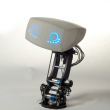 AIDA
AIDA
AUDI and MIT have teamed up to create the perfect intelligent driving agent, Robot AIDA. He can respond to a driver's words and mood and make facial expressions. This robot can suggest the quickest routes with the least traffic for safer, faster travel.…
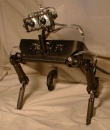 Coco
Coco
MIT unveiled a robotic platform called Coco. Used for social interaction, this quadruped robot has electronic sensors, carbon fiber body, cameras and high speed serial cable.
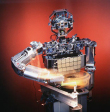 Cog
Cog
Popular with hobbyists, Cog was created in 1994 at MIT to explore interactive learning, with a human-like interface and intelligence modeled on a six-month-old baby.
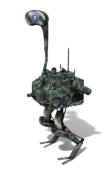 FastRunner
FastRunner
The FastRunner robot was developed by IHMC and patterned after an ostrich. It is capable of moving 27 MPH and has self-stabilizing legs equipped with single motors. IHMC hopes to use the FastRunner robot in fire rescues and natural calamities.
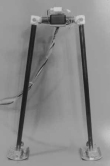 GeekBot
GeekBot
The MIT robot Geekbot was developed for the study of how forces transfer during walking. It has two legs, feet and hips, and moves by rocking from one foot to another.
 Huggable
Huggable
Huggable is an MIT prototype based on a Gund teddy bear and designed to replace real animals for human therapeutic use. It has soft silicone skin and a fur fabric covering.
 Kismet
Kismet
The Kismet is a robot created in 1997 by the robotics experts at MIT. It was designed to participate in human social interaction by having simulated human emotion and appearance. Since the robot's release, its replica was part of a traveling exhibit called…
 Monopod
Monopod
MIT developed a single-legged robot with articulated legs called Monopod. Its articulated legs offer better performance than telescoping legs and can execute leaf spring.
 OCTAVIA (aka LUCAS)
OCTAVIA (aka LUCAS)
Octavia is a wheeled firefighting robot developed by MIT's Personal Robotics Group. The US Navy wanted a robot on board ship in order to help humans deal with fires and other emergencies. Octavia's operating system allows it to track complex objects and…
 Planar Biped
Planar Biped
MIT developed a two-legged planar running machine called Planar Biped. It has a flexible body, uses single-legged algorithms and is used to study movements on rough topography.
 RoboTuna II
RoboTuna II
David Beal and Michael Sachinis of the MIT developed a robotic fish called RoboTuna II. It is designed on a cable pulley system and uses genetic algorithms to learn to swim.
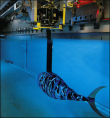 RoboTuna I
RoboTuna I
David Barrett developed RoboTuna I as part of his PhD thesis at MIT. It is the very first functional robotic fish ever created and is controlled by six powerful servomotors.
 SPHERES
SPHERES
SPHERES are spherical satellites that are used inside the international space station to test instructions for spacecraft performing autonomous rendezvous and docking maneuvers. In addition, the SPHERES robots are used by high school students in the annual…
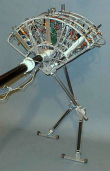 Spring Flamingo
Spring Flamingo
Designed by Jerry Pratt and developed by an ensemble cast at MIT, the Spring Flamingo resembles its avian namesake but has human-like movement due to bent-forward knees.
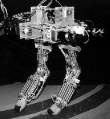 Spring Turkey
Spring Turkey
Less sophisticated than the Spring Flamingo, Spring Turkey was mothballed in 1996. The planar bipedal robot had an un-actuated boom to prevent roll and lateral movement.